Last Tuesday, 23 June 2015, Turkish-French actress and singer Magali Noël died. She acted in French and Italian films between 1951 and 2002. The sexy actress was an object of desire in three masterpieces of Federico Fellini. As a singer, she had one of the first French Rock & Roll hits, which was forbidden for a long time because of its risqué lyrics. Magali Noël was 83.
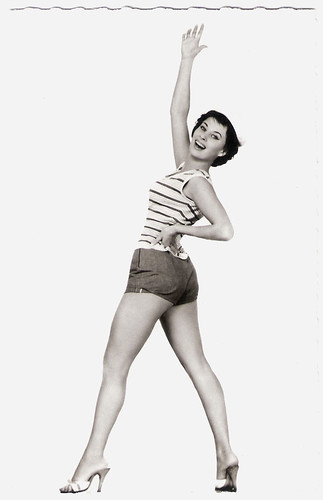
French postcard by Editions du Globe, Paris, no. 866. Photo: Sam Lévin.
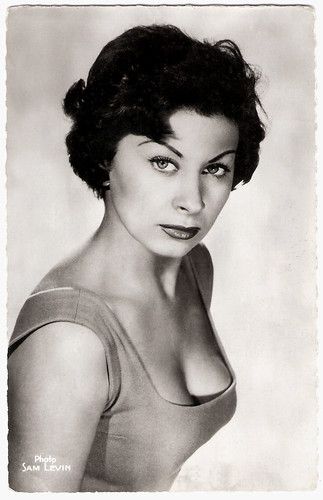
French postcard by Editions du Globe, Paris, no. 414. Photo: Sam Lévin.

Italian postcard by Bromofoto, Milano, no. 1703. Photo: Cineriz. Magali Noël in La Dolce Vita (Federico Fellini, 1960). Collection: Marlene Pilaete.
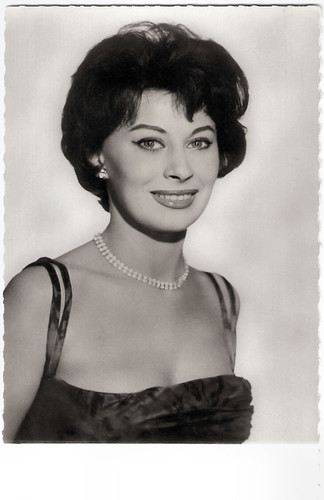
French postcard by Editions P.I., no. 958, offered by Les carbones Korès 'Carboplane'. Photo: Sam Lévin.
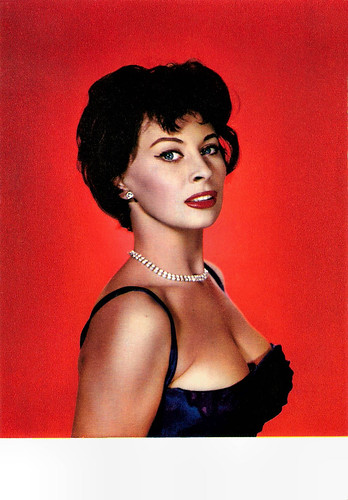
French postcard by Editions P.I., Paris, no. 1010. Photo: Sam Lévin.
Magali Noël was born Magali Noëlle Guiffray in Izmir, Turkey, in 1932. At the age of seven, she emigrated with her family from Turkey to France in 1939.
She studied singing, music and dance, and at age 16, she made her first appearance as a cabaret singer and then appeared in revues. She also studied drama with Catherine Fontenay and then appeared in her first stage plays. In 1951, her film career began with parts in the comedies Demain nous divorçons / Tomorrow we divorce (Louis Cuny, 1951) with Sophie Desmarets, and Seul dans Paris / Alone in Paris (Hervé Bromberger, 1951) as the young wife of Bourvil.
She was noticed for the first time when she appeared in the Film Noir Du rififi chez les hommes / Rififi (Jules Dassin, 1955) starring Jean Servais. James Travers at French Films: “As the film’s stunning femme fatale, the actress Magali Noël had her big break, which would lead her to be cast by Federico Fellini in La Dolce Vita (1960) and two subsequent films. It is Noël who sings the film’s notorious (and often unfairly reviled) musical number, which explains what the slang word Rififi means - a violent confrontation between rival gangs.”
She showed that she was a luscious actress with a fiery temperament in films like Razzia sur la chnouf / Razzia (Henri Decoin, 1955) with Jean Gabin, Les Grandes Manœuvres / The Grand Manoeuvre (René Clair, 1955) with Gérard Philippe, and Elena et les homes / Paris Does Strange Things (Jean Renoir, 1956) featuring Ingrid Bergman.
In 1956, her recording career began in France, and her most famous song was 'Fais-moi mal, Johnny' (Hurt me Johnny), written by Boris Vian. This song was one of the first Rock & Roll songs with French lyrics. It was forbidden on the radio for a long time due to its risqué lyrics describing – with a great sense of humour and derision – a sadomasochistic episode.
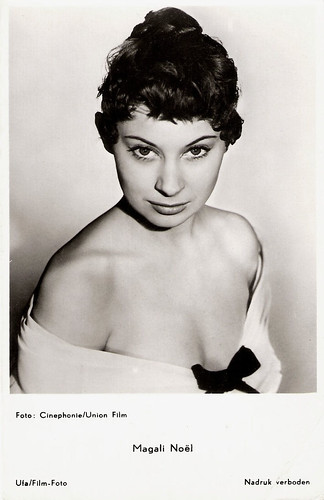
Belgian-Dutch postcard by D.R.C., no. 1393. License holder for Ufa. Photo: Cinephonie / Union Film.
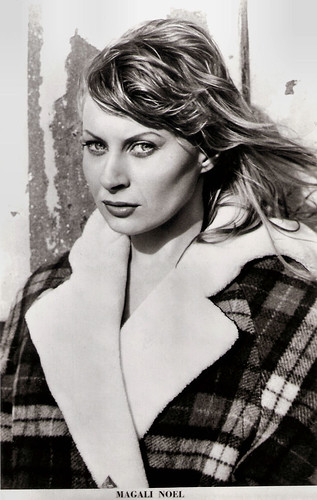
Italian postcard by Foto S.P.E.S., Roma, no. 648. Photo: E.R.A. Cinematografica. Publicity still for E arrivata la parigina / The Parisienne has arrived (Camillo Mastrocinque, 1958).
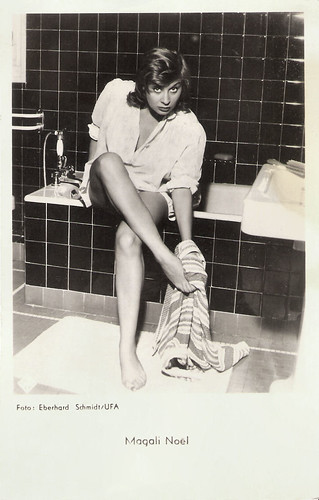
French postcard by Editions P.I., Paris, no. FK 3336. Photo: Eberhardt Schmidt / Ufa.
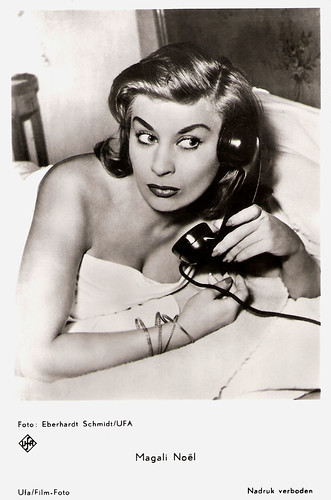
Belgian postcard by D.R.C. Holland, no. 3336. Photo: Eberhardt Schmidt / Ufa.

German postcard by Kolibri-Verlag G.m.b.H., Minden/Westf., no. 2531. Photo: Deutsche Cosmopol-Film. Ivan Desny and Magali Noel in O.S.S. 117 n'est pas mort / O.S.S. 117 Is Not Dead (Jean Sacha, 1957).
Magali Noël’s film career took a new turn when she appeared as Fanny in Federico Fellini's La Dolce Vita (1960), starring Marcello Mastroianni. She was again a symbol of sexual fantasies as Fortunata in Fellini's Satyricon (1969) and especially in his Amarcord (1973).
In Amarcord, Noël played a sexy provincial hairdresser with the evocative nickname Gradisca (Taste it). Robert Firsching at AllMovie: “Federico Fellini's warmly nostalgic memory piece examines daily life in the Italian village of Rimini during the reign of Mussolini, and won the 1974 Academy Award as Best Foreign Film. The film's greatest asset is its ability to be sweet without being cloying, due in great part to Danilo Donati's surrealistic art direction and to the frequently bawdy injections of sex and politics by screenwriters Fellini and Tonino Guerra. Fellini clearly has deep affection for the people of this seaside village, warts and all, and communicates it through episodic visual anecdotes which are seen as if through the mists of a favourite dream."
Noël also had a key role in another masterpiece, Costa Gravas’ political thriller Z (1968), which won the Palme d’Or in Cannes, Dan Pavlides at AllMovie: "Z won the Oscar for Best Foreign Film of 1969, was 14th in terms of box-office success, and hit an international nerve in the age of social unrest, government cover-up, and political assassinations. All those involved worked on the film for a reduced rate with an option for royalties based on earnings at the theatre window. The letter Z in the Greek alphabet means ‘he is alive’."
Despite Magali Noël's work for Fellini and Costa-Gavras, producers offered her less work. So she returned successfully to the music hall. Later, a new generation of directors started to offer her roles. Among her later films are Les Rendez-vous d’Anna / Anna's Meetings (Chantal Akerman, 1978), Le chemin perdu / The lost way (Patricia Moraz, 1980) with Charles Vanel, and La Mort de Mario Ricci / The Death of Mario Ricci (Claude Goretta, 1982) featuring Gian Maria Volonté.
From 1980 on, her career extended to television films. Among her later feature films are La Fidélité / Fidelity (Andrzej Zulawski, 2000) as the mother of Sophie Marceau, and the thriller The Truth About Charlie (Jonathan Demme, 2002) with Mark Wahlberg. Magali Noël’s last film appearance was in Rien que du bonheur (Denis Parent, 2003). Magali Noël had a daughter with actor Jean-Pierre Bernard and two sons, whom she had adopted when she remarried. She died in 2015, four days before her 84th birthday, in the retirement home in Chateauneuf-Grasse, where she lived.
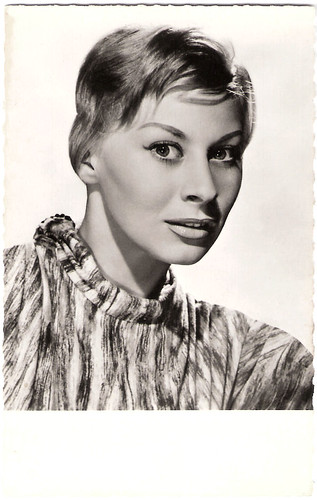
French postcard by Editions P.I., no. 897. Photo: Lucienne Chevert.
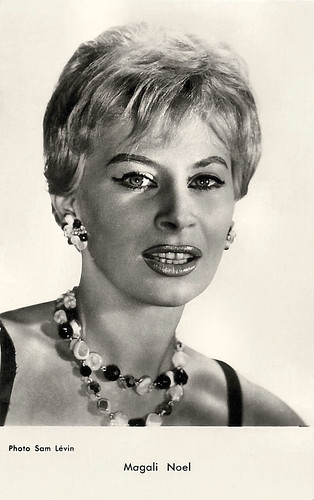
French postcard by Editions P.I., Paris. Offered by Les Carbones Korès, no. 1115. Photo: Sam Lévin.
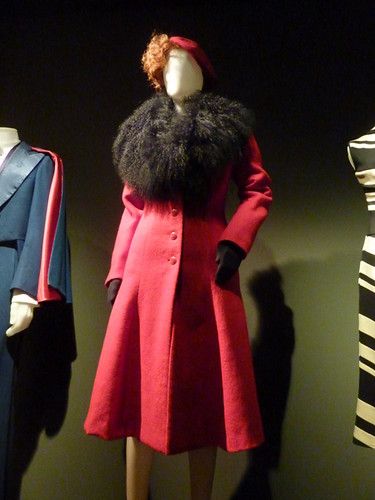
Costume of Magali Noël (Gradisca) in Amarcord (Federico Fellini 1973) at a costume exhibition in Cinecittà, Roma. Photo: Bob, Truus & Jan Too!@Flickr.
Italian trailer for Totò e Cleopatra (1963). Source: Film&Clips (YouTube).
Trailer Amarcord (1973). Source: Danios12345 (YouTube).
Sources: James Travers (Films de France), Hal Erickson (AllMovie - Page now defunct), Robert Firsching (AllMovie - Page now defunct), Dan Pavlides (AllMovie - Page now defunct), Le Monde (French), Magali Noël.ch (Now defunct), Wikipedia and IMDb.
This post was last updated on 26 December 2025.

French postcard by Editions du Globe, Paris, no. 866. Photo: Sam Lévin.

French postcard by Editions du Globe, Paris, no. 414. Photo: Sam Lévin.

Italian postcard by Bromofoto, Milano, no. 1703. Photo: Cineriz. Magali Noël in La Dolce Vita (Federico Fellini, 1960). Collection: Marlene Pilaete.

French postcard by Editions P.I., no. 958, offered by Les carbones Korès 'Carboplane'. Photo: Sam Lévin.

French postcard by Editions P.I., Paris, no. 1010. Photo: Sam Lévin.
Hurt me Johnny
Magali Noël was born Magali Noëlle Guiffray in Izmir, Turkey, in 1932. At the age of seven, she emigrated with her family from Turkey to France in 1939.
She studied singing, music and dance, and at age 16, she made her first appearance as a cabaret singer and then appeared in revues. She also studied drama with Catherine Fontenay and then appeared in her first stage plays. In 1951, her film career began with parts in the comedies Demain nous divorçons / Tomorrow we divorce (Louis Cuny, 1951) with Sophie Desmarets, and Seul dans Paris / Alone in Paris (Hervé Bromberger, 1951) as the young wife of Bourvil.
She was noticed for the first time when she appeared in the Film Noir Du rififi chez les hommes / Rififi (Jules Dassin, 1955) starring Jean Servais. James Travers at French Films: “As the film’s stunning femme fatale, the actress Magali Noël had her big break, which would lead her to be cast by Federico Fellini in La Dolce Vita (1960) and two subsequent films. It is Noël who sings the film’s notorious (and often unfairly reviled) musical number, which explains what the slang word Rififi means - a violent confrontation between rival gangs.”
She showed that she was a luscious actress with a fiery temperament in films like Razzia sur la chnouf / Razzia (Henri Decoin, 1955) with Jean Gabin, Les Grandes Manœuvres / The Grand Manoeuvre (René Clair, 1955) with Gérard Philippe, and Elena et les homes / Paris Does Strange Things (Jean Renoir, 1956) featuring Ingrid Bergman.
In 1956, her recording career began in France, and her most famous song was 'Fais-moi mal, Johnny' (Hurt me Johnny), written by Boris Vian. This song was one of the first Rock & Roll songs with French lyrics. It was forbidden on the radio for a long time due to its risqué lyrics describing – with a great sense of humour and derision – a sadomasochistic episode.

Belgian-Dutch postcard by D.R.C., no. 1393. License holder for Ufa. Photo: Cinephonie / Union Film.

Italian postcard by Foto S.P.E.S., Roma, no. 648. Photo: E.R.A. Cinematografica. Publicity still for E arrivata la parigina / The Parisienne has arrived (Camillo Mastrocinque, 1958).

French postcard by Editions P.I., Paris, no. FK 3336. Photo: Eberhardt Schmidt / Ufa.

Belgian postcard by D.R.C. Holland, no. 3336. Photo: Eberhardt Schmidt / Ufa.

German postcard by Kolibri-Verlag G.m.b.H., Minden/Westf., no. 2531. Photo: Deutsche Cosmopol-Film. Ivan Desny and Magali Noel in O.S.S. 117 n'est pas mort / O.S.S. 117 Is Not Dead (Jean Sacha, 1957).
A symbol of Fellini's sexual fantasies
Magali Noël’s film career took a new turn when she appeared as Fanny in Federico Fellini's La Dolce Vita (1960), starring Marcello Mastroianni. She was again a symbol of sexual fantasies as Fortunata in Fellini's Satyricon (1969) and especially in his Amarcord (1973).
In Amarcord, Noël played a sexy provincial hairdresser with the evocative nickname Gradisca (Taste it). Robert Firsching at AllMovie: “Federico Fellini's warmly nostalgic memory piece examines daily life in the Italian village of Rimini during the reign of Mussolini, and won the 1974 Academy Award as Best Foreign Film. The film's greatest asset is its ability to be sweet without being cloying, due in great part to Danilo Donati's surrealistic art direction and to the frequently bawdy injections of sex and politics by screenwriters Fellini and Tonino Guerra. Fellini clearly has deep affection for the people of this seaside village, warts and all, and communicates it through episodic visual anecdotes which are seen as if through the mists of a favourite dream."
Noël also had a key role in another masterpiece, Costa Gravas’ political thriller Z (1968), which won the Palme d’Or in Cannes, Dan Pavlides at AllMovie: "Z won the Oscar for Best Foreign Film of 1969, was 14th in terms of box-office success, and hit an international nerve in the age of social unrest, government cover-up, and political assassinations. All those involved worked on the film for a reduced rate with an option for royalties based on earnings at the theatre window. The letter Z in the Greek alphabet means ‘he is alive’."
Despite Magali Noël's work for Fellini and Costa-Gavras, producers offered her less work. So she returned successfully to the music hall. Later, a new generation of directors started to offer her roles. Among her later films are Les Rendez-vous d’Anna / Anna's Meetings (Chantal Akerman, 1978), Le chemin perdu / The lost way (Patricia Moraz, 1980) with Charles Vanel, and La Mort de Mario Ricci / The Death of Mario Ricci (Claude Goretta, 1982) featuring Gian Maria Volonté.
From 1980 on, her career extended to television films. Among her later feature films are La Fidélité / Fidelity (Andrzej Zulawski, 2000) as the mother of Sophie Marceau, and the thriller The Truth About Charlie (Jonathan Demme, 2002) with Mark Wahlberg. Magali Noël’s last film appearance was in Rien que du bonheur (Denis Parent, 2003). Magali Noël had a daughter with actor Jean-Pierre Bernard and two sons, whom she had adopted when she remarried. She died in 2015, four days before her 84th birthday, in the retirement home in Chateauneuf-Grasse, where she lived.

French postcard by Editions P.I., no. 897. Photo: Lucienne Chevert.

French postcard by Editions P.I., Paris. Offered by Les Carbones Korès, no. 1115. Photo: Sam Lévin.

Costume of Magali Noël (Gradisca) in Amarcord (Federico Fellini 1973) at a costume exhibition in Cinecittà, Roma. Photo: Bob, Truus & Jan Too!@Flickr.
Italian trailer for Totò e Cleopatra (1963). Source: Film&Clips (YouTube).
Trailer Amarcord (1973). Source: Danios12345 (YouTube).
Sources: James Travers (Films de France), Hal Erickson (AllMovie - Page now defunct), Robert Firsching (AllMovie - Page now defunct), Dan Pavlides (AllMovie - Page now defunct), Le Monde (French), Magali Noël.ch (Now defunct), Wikipedia and IMDb.
This post was last updated on 26 December 2025.
No comments:
Post a Comment